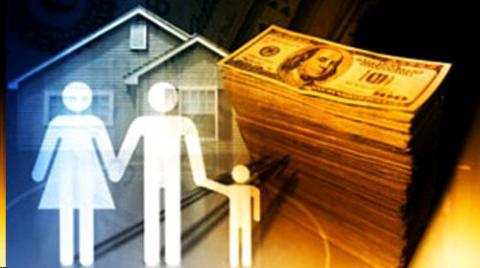Poll: Americans Support a Fairer Distribution of Wealth

From New America Media and FinalCall.com: On the streets of the nation’s capital, random downtown workers were asked, “Would America be better if the distribution of wealth was more equal?” Overwhelmingly they answered, “Yes.”
“Are you kidding?” said Julius Montgomery on his way to work. “Have you heard about the 1 percent and the 99 percent? Why should such a small number of Americans make so much more money than the rest of us and we have no chance in hell to even catch up. Is this really America? Or is this some plutocracy where the rich rule?”
A majority, 60 percent, of Americans said society would be better off if the distribution of wealth were more equal, according to the 2011 American Values Survey conducted by the Public Religion Research Institute.
It found that while a majority of Americans agree on this point, there are large partisan, ethnic, and generational disagreements about the distribution of wealth in society.
“We are witnessing the emergence of a generational fault line over what constitutes a good society,” said Dr. Robert P. Jones, CEO of the Public Religion Research Institute. “Seven-in-ten of the Millennial generation believe that society would be better off if the distribution of wealth were more equal, while a majority of seniors disagree.”
This generational disagreement may be because seniors made dramatic gains relative to those by younger adults in economic well-being over the past quarter century, according to an analysis of government data by the Pew Research Center since 1984.
Their research found that in 2009, households headed by adults ages 65 and older possessed 42 percent more median net worth than their counterparts had in 1984. By contrast, households headed by adults younger than 35 in 2009 had 68 percent less median net worth than their counterparts had in 1984. This is the largest gap in the 25 years that the government has been collecting such data.
Pew Director Paul Taylor explained on National Public Radio that the recent recession accelerated this trend. Due to retirement and home purchases years ago, many seniors were spared the hardship of massive job losses or the housing crisis. Young adults, by contrast, face crushing unemployment and likely bought their homes at the height of the market bubble.
But Taylor said the opposing fortunes of young and old predate the recession and reflect a number of social and economic changes.
For one thing, a much higher percentage of older adults today are still employed.
According to the poll, with the exception of Americans who identify with the Tea Party, respondents strongly support proposals to address economic inequality at both the top and bottom of the income spectrum.
Seven-in-ten Americans support increasing the tax rate on Americans earning more than $1 million per year and two-thirds also support raising the minimum wage from $7.25 to $10 per hour.
However, Americans who identify with the Tea Party oppose both proposals.
“Something has to be done. We can’t continue to go on like this. President Obama wants to change things and the Republicans don’t want to tax the rich or raise the minimum wage. I’m so sick of them. People are really struggling and hurting. This may be a great time to be a senior, but it’s a really bad time to be a young person,” Malika Johnson told The Final Call.
“I look at my parents’ life and wish it were mine. They’re retired educators with a home that’s paid off. With money saved in the bank, they’re enjoying their golden years. When I look at my life with college debt, no home, and a shaky job, I know things can’t continue like this. I’m not down at Occupy D.C., but I want to be.”
Americans are also divided on the issue of equal opportunity. A majority (53 percent) of Americans believe that one of the biggest problems in the country is that everyone does not have an equal chance in life. Four-in-ten Americans say that it is not really that big a problem if some people have more of a chance than others.
“Things are better in some ways, but in other ways it’s just a smoke screen to make us think we can get ahead when we can’t,” said Harold Roberts, who is headed towards retirement in the spring. “I grew up hearing that Blacks have to work twice as hard to get just as far as White people. I tell that to my grandkids, and they don’t get it. They think they can do whatever, but I’m going to tell them about this poll. It’s not right, but it’s the reality.”
The net worth of African-American households according to Pew Research fell from $12,124 in 2005 to $5,677 in 2009, a decline of 53 percent. Like Hispanics, African-American households drew a large share (59 percent) of their net worth from home equity in 2005.
Thus, the housing downturn had a strong impact on their net worth. African-Americans also took on more unsecured debt during the economic downturn.






























































































































































































































































































































